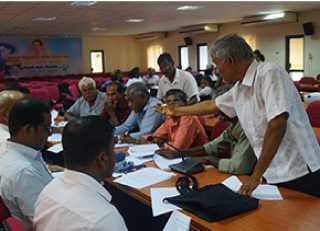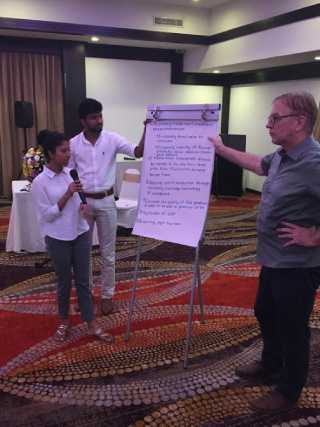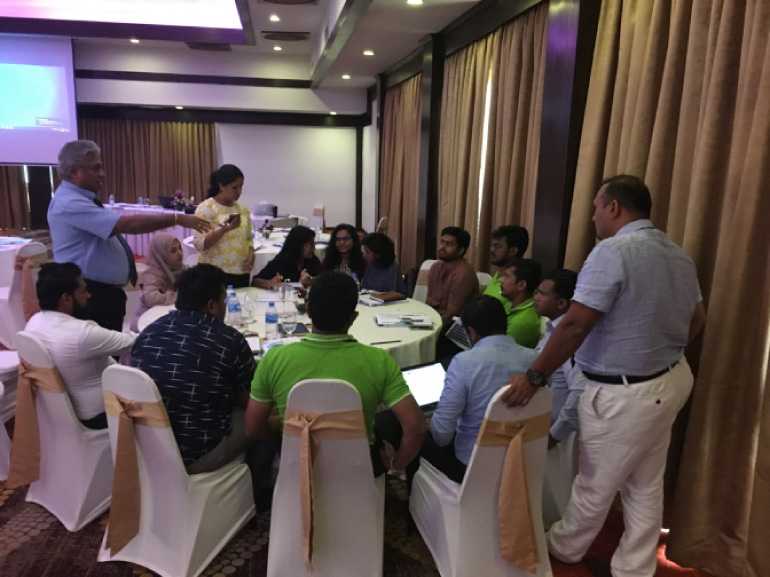Tuesday Feb 24, 2026
Tuesday Feb 24, 2026
Friday, 5 June 2020 01:37 - - {{hitsCtrl.values.hits}}
 |
| Farmers participating in a TAMAP workshop on value chain analysis in Hambantota |
 |
| Agricultural stakeholders participating in a TAMAP workshop on value chain analysis in Kandy
|
As the COVID-19 pandemic is negatively impacting lives and livelihoods, collaboration amongst various stakeholders along the food value chain are more critical than ever before.
The European Union-funded ‘Technical Assistance to the Modernisation of Agriculture Programme’ (TAMAP) aims to increase the productivity and efficiency of the agriculture sector through specific interventions.
The program is implemented by the consulting company, Ecorys Nederland B.V. and has recently conducted agricultural value chain analysis studies for horticulture (fruits and vegetables), aquaculture, dairy, apiculture, floriculture, Palmyra and essential oils. TAMAP conducted a series of workshops and trainings in Kandy and Colombo to disseminate the findings based on the studies.
TAMAP team leader Dr. Christof Batzlen explained: “In 14 months we have developed eight value chain studies on various commodities. We focused on the functionality of the value chains, as well as the economic, social and environmental aspects.”
The value chain study outputs are vital to train stakeholders and agricultural officers with the aim of increasing the volume and quality of products traded in the various value chains in Sri Lanka.
TAMAP’s value chain expert Han van de Meerendonk observed, “For many commodities, a major part of the margin does not remain with the farmers, but with the intermediary, exporter or processor. We looked at how to increase the bargaining power of farmers to secure a higher income and how to add value along these value chains.”
He added, “To develop Sri Lanka’s agriculture into a market-driven sector, we need to follow an approach which is by itself market-driven. Our analysis provides much needed evidence and highlights the strengths and weaknesses in the different markets.”
TAMAP Agricultural Economist Dr. Chatura Rodrigo explained, “The objective was to analyse opportunities for export promotion and import substitution and we selected these value chains accordingly.”
He noted, “We spoke to all relevant stakeholders and had focus group discussions with farmers. Value chains have different trading channels. Each trading channel creates value for its stakeholders. This is expressed through the price margin that each stakeholder gets. We wanted to compare different trading channels in a value chain in order to see which trading channels provide the best incentives for the farmer.”
Illustrating the challenges, Dr. Rodrigo said, “Challenges are related to the business environment – this includes challenges in regulatory and compliance systems. Furthermore, since a large number of farmers are not well acquainted with basic principles for farming as a business, they face challenges in maximising their livelihood.”
“There are also specific issues for export value chains and non-export value chains. Export value chains face issues with processing, transport and logistics,” he noted.
Dr. Rodrigo advised, “Large-scale farmers are capable of using economies of scale. However, for the smaller ones it is not possible. They face a lot of issues in terms of their operational efficiency. They are not commercial farmers but if they aspire to be in the commercial value chain they have to improve their productivity. Through technology and strategic investments, it can be done. We need to look into ways of advancing farmers to the next stage.”
The value chain studies also provide a wealth of information on opportunities to diversify the Sri Lankan agricultural sector into higher value-added products as well as to strengthen the social inclusion of smallholder farmers and especially women in these sectors.
The findings of these value chain studies will be shared among a wider Sri Lankan audience of private sector stakeholders, development projects, practitioners and government bodies in order to utilise them for future interventions in the agricultural sector.
EU Delegation Program Manager Dr. Olaf Heidelbach concluded, “We aim to incorporate the findings and recommendations of the value chain studies in the Overarching Agriculture Policy (OAP) and strategy that is currently being developed jointly with the government.”
